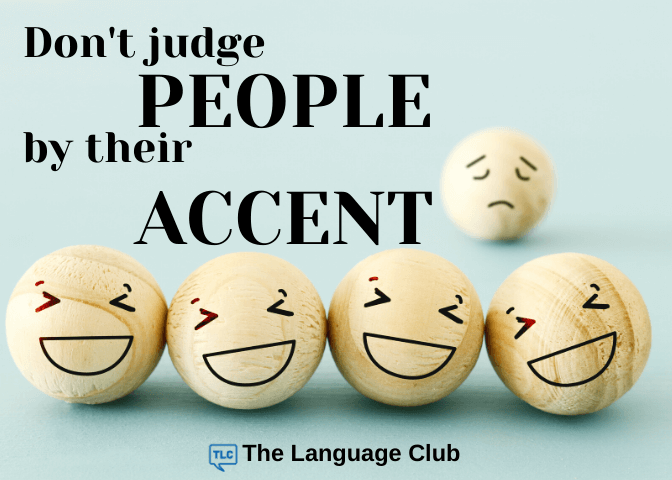The words of your new language will taste better if you spice them up with a splash of culture.

Language is not only about words; it’s an important part of culture along with traditions, food, religion, music, and art. When Learning a language, immerse yourself in the delicacies of local cuisine, dance to the rhythm of local music, stroll through local art galleries and observe local ways of life. By doing this, the language will make more sense to you, and your motivation to keep learning it will never let you down.
Polyglotism is the GPS that allows us to travel across cultures.

Knowing more than one language will always open doors to new traveling experiences. It will take you through paths never traveled by others and allow you to see the world through the eyes of culture.
Preserve your mother tongue; it’s an integral part of your identity.

Our mother tongue holds our values, beliefs, and identity. Sadly some people that have been living in foreign countries for generations are mostly more likely to adopt the local language and forget their mother-tongue. If that’s your case, challenge yourself by learning your mother-tongue or improve it by listening to music, watching movies or reading folk tales. Preserving your mother-tongue will assure the survival of your culture too!
No matter what language you speak, always use your wisdom to weigh your words.
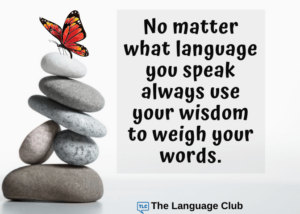
Nowadays, being a good communicator goes beyond the language we speak; it requires a good dose of common sense and a great amount of wisdom. When communicating with others, especially if they come from a different culture, it is important to be sensitive and reflect our wisdom through our choice of words.
Your accent makes you unique – wear it with pride!

One of the main reasons people refuse to use their brand-new language is because of their accent. You can speak a language perfectly and yet have an accent, so what? Your accent is part of you; it makes you unique, and it proves that you speak more than one language. Wear it with pride!
Your mouth releases the words, but your tone conveys the message.

Words have power, we all know that, and they can become weapons if loaded with the wrong tone. You can listen to a conversation in a language that you don’t understand and get the essence of the conversation just by observing the non-verbal signals like the tone and body language. Your tone translates your thoughts, and it can make or break a conversation. Have you ever stopped and analyzed the tone you generally use? Is it sarcastic, manipulative, kind, angry? Do you use a different tone at work, at home, with strangers? If people always react negatively to what you say, maybe your tone is betraying you. So, remember it’s not what you say but how you say it that will make you a great communicator.
Consistency is the key to fluency.
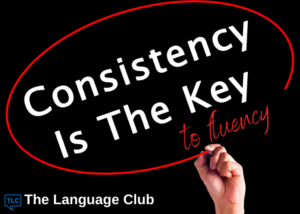
As the internationally known speaker and motivator, Anthony Robbin, said, “It’s not what we do once in a while that shapes our lives. It’s what we do consistently.” his is also true in language learning; your fluency will not arrive written on a certificate in your mailbox, it will be downloaded into your brain little by little when you make language learning part of your daily routine and habits.
You will make mistakes – learn from them!
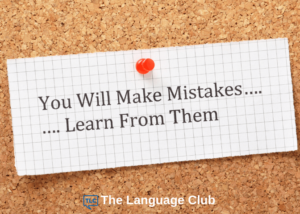
Think about it. How did you get so far in your life? What made you what you are today? Your experience, right? Well your life experience was probably a rocky path filled with uncomfortable moments called mistakes. You learned from them and it made you a better person. The same thing will happen while learning a language; you will make many mistakes that you need to embrace as they will be the steppingstones that will lead you to fluency.
IGNORE the fact that sometimes you will feel awkward when talking to native speakers. Learning a new language makes you SMARTER. Period!

Studies have shown that learning a second language significantly improves brain health. In his article named The Healthy Linguistic Diet, Dr. Thomas H. Bak explains the positive effects of bilingualism on cognitive functions. We all feel awkward, helpless or even embarrassed at a point in our lives when we are trying to have a serious conversation with native speakers. Therefore, we dread meetings or job interviews. We all know that we could easy nail those same conversations if they were in our native language – but don’t despair. If you find yourself in such a situation, inform your interlocutors of your lack fluency; usually people will be empathetic towards you.
We all smile in the same language.
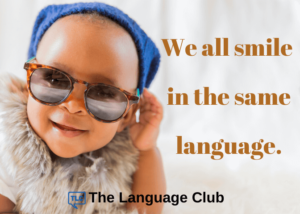
Yes, we do!

